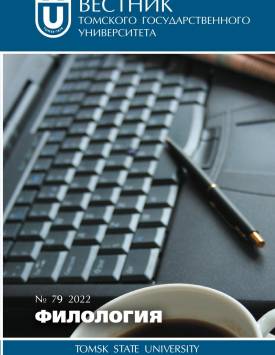Book review: Popov, D.V. (2021) Stil’ "pletenie slaves” v poslaniyakh Ivana Groznogo [The style of “weaving words” in the epistles of Ivan the Terrible]. Moscow: Pero
This article is a review of the book The Style of “Weaving Words " in the Epistles of Ivan the Terrible by Dmitry Popov. The reviewed monograph is dedicated to one of the most pressing problems in modem linguistics - the problem of the development of the Russian literary language, as well as the role of the second South Slavic influence in its formation. In the book, the author considers the following issues: the definition of the norm of the Russian literary language of the 16th century, the peculiarities of the language personality of Ivan the Terrible, the problem of the correlation of individual features of the style and linguistically significant features of the linguistic situation of that era, linguistic bilingualism manifested in the opposition of the spoken style of speech to the language of literature, etc. Having analyzed the structural and content features of this work, the reviewer states its undoubted theoretical and practical significance. The relevance of the book is in the author’s discussion of one of the essential, yet insufficiently studied, problem - the second South Slavic influence and its role in the formation of the literary language of that time. The novelty of the work lies in the characterization of the style of “weaving words” as one of the best models of the manifestation of the second South Slavic influence in the journalistic texts of the 16th century on the example of the epistolary heritage of Ivan the Terrible,. The author for the first time examines in detail the lexical, syntactic, stylistic features of the epistles of Ivan the Terrible as a language personality. Popov characterizes these features in the context of the “weaving words” style, including the following features: (a) lexical (a large number of borrowed words, composites, abstract nouns, contextual synonyms and antonyms, tautology, inclusion of colloquialisms and even swear words); (b) grammatical (the presence of a complex system of verb forms of the past tense; (c) syntactic (the use of periphrastic phrases, various rhetorical devices, means of expressive syntax), etc. Popov comes to the conclusion that Ivan the Terrible brought some qualitatively new features to the structure and content of the works of the epistolary genre, including the following: pronounced journalistic, polemic elements of colloquial style of speech, mixing of oral speech (often abusive vocabulary) with high literary language, irony. The author of the book notes that, thanks to Ivan the Terrible, writing lost its canonical features, becoming a free genre. In this regard, we can speak about the emergence of the so-called epistolary journalism in the 16th century. He draws a conclusion about the influence on literature and public consciousness as a whole of the Hesychastic religious teaching that dominated in that era and was realized in the form of the predominance of the “weaving words” style. This monograph may be of interest to linguists, literary critics interested in the problem of the formation of the Russian literary language, in particular the reflection of the second South Slavic influence in it. The authordeclares no conflicts of interests.
Keywords
history of Russian literary language, second South Slavic influence, “weaving words” style, epistolary genre, language personality of Ivan the TerribleAuthors
| Name | Organization | |
| Gavrikova Irina Yu. | Moscow Institute of Physics and Technology (National Research University) | dolunay@yandex.ru |
References

Book review: Popov, D.V. (2021) Stil’ "pletenie slaves” v poslaniyakh Ivana Groznogo [The style of “weaving words” in the epistles of Ivan the Terrible]. Moscow: Pero | Vestnik Tomskogo gosudarstvennogo universiteta. Filologiya – Tomsk State University Journal of Philology. 2022. № 79. DOI: 10.17223/19986645/79/15
